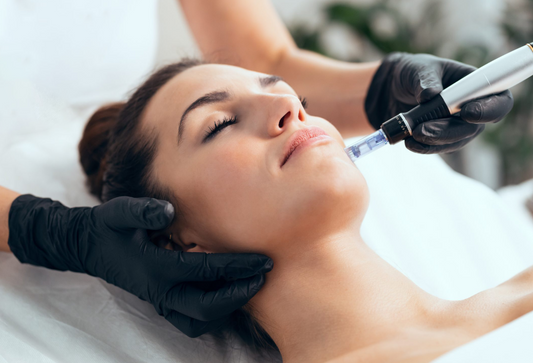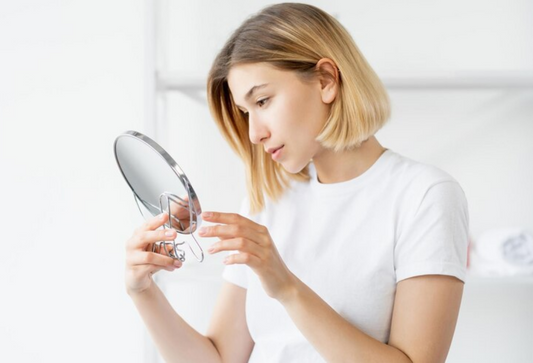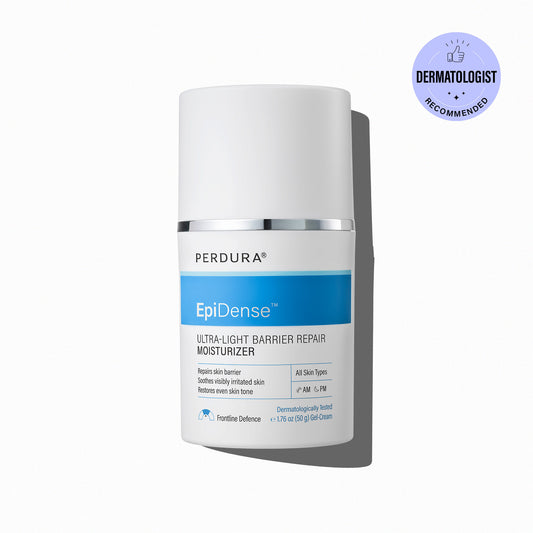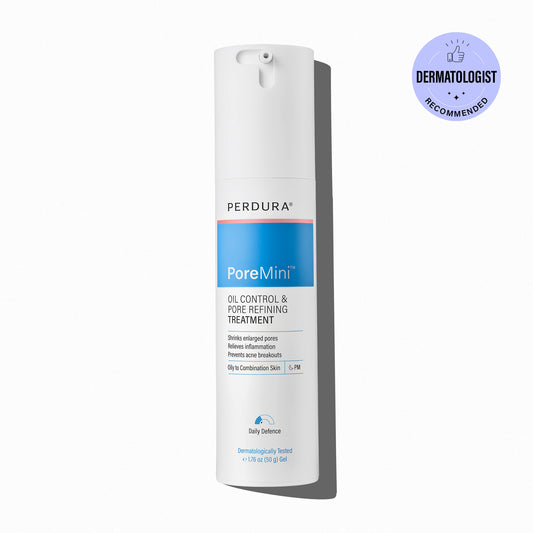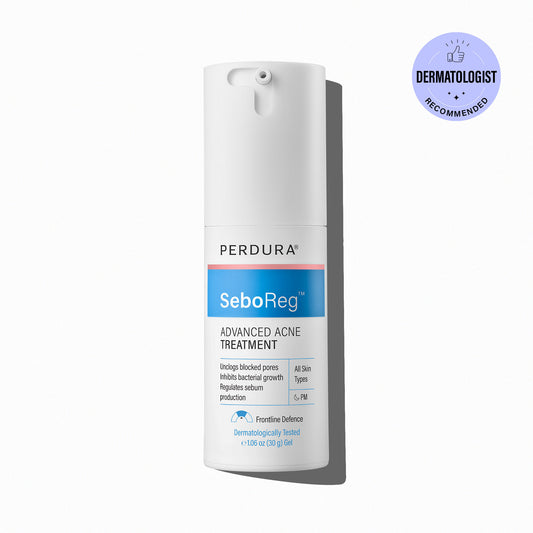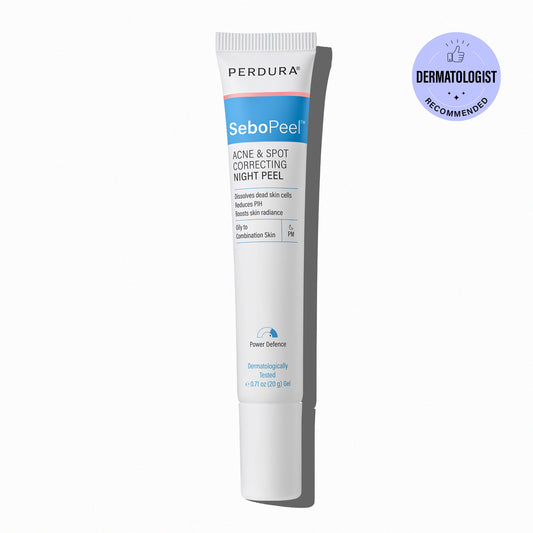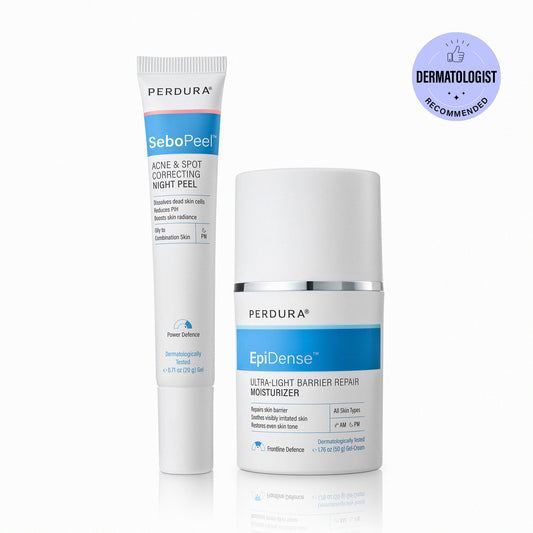Introduction
We all know the saying: beauty isn't just skin deep. But when it comes to achieving a clear, radiant complexion, sometimes it feels like that's all we focus on. Don't get us wrong, a good skincare routine is essential. But did you know that up to 85% of people between 12 and 24 experience acne, and a big part of managing it can come from within?
Curious about what your breakouts are trying to tell you? Read our detailed guide - Acne 101, for some answers!
Here's the truth: achieving clear skin is a two-pronged approach. Just like a healthy body starts from the inside out, healthy skin needs internal nourishment too. This blog will delve into how diet and lifestyle choices can influence oily skin and acne.
Find out the unexpected causes of acne and how to avoid them in our article on 5 Surprising Acne Triggers
We'll also show you how to combine these insights with a powerful skincare routine to unlock your skin's true potential. Now, let's get glowing!
Understanding Oily Skin and Acne
Ever wonder why your skin seems too shiny and greasy, even after you wash your face? That's likely due to oily skin, a condition caused by overactive sebaceous glands. These tiny glands at the base of your hair follicles produce sebum, a natural oil that helps keep your skin hydrated and protected. However, when these glands go into overdrive, they pump out too much sebum, leading to that slick, oily feeling on your skin.
But what triggers these sebaceous glands?
- Hormonal fluctuations: Hormones play a significant role in oil production. During puberty, for example, surges in androgens (male hormones present in both sexes) can stimulate sebaceous glands, leading to oilier skin and acne breakouts. Similarly, hormonal changes during menstruation or pregnancy can also affect oil production.
In our next blog post, Hormonal Havoc: Unveiling the Truth About Hormonal Acne, we'll delve deeper into the world of hormones and their impact on your skin.
- Diet: While the exact link is still being researched, studies suggest a connection between diet and acne. Certain foods, like those with a high glycemic index (GI)—sugary drinks and refined carbohydrates—can cause spikes in blood glucose levels, which may trigger the release of hormones that increase oil production and acne.
- Stress: Chronic stress can wreak havoc on your skin by elevating cortisol levels, a hormone that stimulates oil production and worsens acne breakouts.
- Genetics: Your skin type is partly inherited like eye colour. If your parents have oily skin, you might be predisposed to it, too.
- Bacteria: An overgrowth of certain bacteria on your skin can break down natural oils, triggering your glands to produce more to compensate.
- Cosmetics: Comedogenic makeup or skincare products can clog pores, trap oil, and lead to breakouts.

Diet and Oily Skin: What You Eat Matters
We've established the connection between internal factors and oily skin and acne. Now, let's understand how to change your diet to improve skin health.
Foods to Limit:
- High-glycemic-index (GI) Foods cause rapid blood sugar spikes, potentially triggering oil production. While white bread and pastries might be tempting breakfast options, swap them for a bowl of fibre-rich dalia (broken wheat porridge) or a masala omelette with whole-wheat roti for a more balanced start.
- Dairy Products: While the research is ongoing, some studies suggest a link between dairy consumption and breakouts. Consider limiting full-fat dairy products like milk and ghee. You can explore alternatives like plant-based milk made from almonds, soy, or coconut.
- Deep-Fried Foods: We all love those crispy samosas and pakoras, but frequent indulgence in deep-fried fare can worsen acne. Opt for healthier cooking methods like grilling, baking, or stir-frying instead.
Foods to Embrace:

- Fruits and Vegetables: They're your best friends for glowing skin! Load up on antioxidant-rich options like amla (Indian gooseberry), oranges, spinach, methi (fenugreek leaves), and carrots. These not only fight inflammation but also provide essential vitamins and minerals.
- Whole Grains: Refined carbohydrates like white rice can spike blood sugar. Instead, choose whole grains like brown rice, jowar (sorghum roti), and bajra (pearl millet roti) for sustained energy and a balanced diet.
- Lean Proteins: Protein is essential for healthy skin. Choose lean protein sources like grilled chicken, fish (salmon is rich in omega-3s!), dals (lentils), and tofu for healthy building blocks without the added oil.
Spotlight on Key Ingredients
- Omega-3 Fatty Acids: These anti-inflammatory fats can help reduce acne breakouts. Incorporate fatty fish like salmon (readily available in some Indian metros) or vegetarian sources like flaxseeds and chia seeds into your diet.
- Vitamin A: Get your daily vitamin A dose from brightly coloured fruits and vegetables like carrots, mangoes, pumpkins, and sweet potatoes.
- Zinc: Zinc helps regulate sebum production and promotes skin healing. Munch on pumpkin seeds, a readily available snack, or include chickpeas and lentils in your dals for a zinc boost.
- Vitamin E: In nuts and seeds like almonds and sunflower seeds, vitamin E protects your skin from damage and may reduce inflammation.
Remember, consistency is key! Small changes can create an internal environment that promotes healthy skin and potentially reduces oiliness and acne breakouts.
The Winning Combination
Combining a balanced, healthy diet with the right products allows you to get the clear skin you want. Check out Our PoreMini - Oil Control Gel - a powerful ally in your fight against oily skin and enlarged pores. This lightweight, non-comedogenic formula (meaning it won't clog your pores) works in two key ways:
- Minimizes Pores: With continued use, PoreMini helps tighten and refine the appearance of enlarged pores, leaving your skin looking smoother and more even-toned.
- Controls Oil: This targeted gel effectively controls excess sebum production, reducing shine and preventing future breakouts.
Discover how PoreMini Oil - Control Gel can help minimize pores and prevent acne breakouts.
Lifestyle Habits for Glowing Skin
Getting clear skin is a holistic journey, and your lifestyle choices play a crucial role, too! Here are some key habits to incorporate:
De-Stress!
Yoga and meditation are excellent ways to calm your mind and body. Even a few minutes of deep breathing daily can help manage stress levels, which reduce cortisol release and sebum secretion.
Make time for activities you enjoy, whether it's spending time in nature, listening to music, or reading a good book. Engaging in hobbies that bring you joy can significantly reduce stress.
Sleep Hygiene
While you sleep, your skin sheds dead cells and regenerates new ones. This process slows down without adequate sleep, leading to dull, tired-looking skin. When you don't get enough sleep, it can lead to physical and mental stress and hormonal imbalances that affect your skin’s health.
By incorporating these lifestyle changes, a balanced diet, and a good skincare routine, you're creating a powerful foundation for healthy, clear skin. To further enhance your acne control efforts, consider adding SeboReg - Acne Control Gel to your regimen.
The Importance of Skin Hygiene
A consistent skincare routine helps manage oily skin and acne, but being gentle is just as important. Here’s how you can keep it balanced!
- Wash your face twice daily, in the morning and before bed, with lukewarm water and a gentle cleanser formulated for oily skin. These cleansers remove excess oil, dirt, and impurities without stripping your skin's natural moisture barrier.
- While it might feel tempting to scrub away oil, harsh scrubs can irritate your skin and stimulate oil production to compensate for the dryness. If your skin feels tight or dry after cleansing, you might be overwashing. Opt for gentle circular motions with your fingertips for effective cleansing.
- Your pillowcase absorbs sweat, oil, and dead skin cells overnight. Wash your pillowcases at least once a week, and more often if you sweat at night, to prevent these impurities from transferring back to your skin.
- Choose non-comedogenic makeup products that won't clog your pores. Look for labels that say "non-comedogenic" or "oil-free." Remove your makeup thoroughly before bed to prevent clogged pores and breakouts.
- Exfoliation is essential in any skincare routine, especially for oily skin.
SeboPeel - Exfoliating Gel is a gentle yet effective formula that helps remove dead skin cells that can clog pores and contribute to breakouts. SeboPeel helps reveal a smoother, brighter complexion by removing dead skin cells. Find out more!
- Just because your skin is oily doesn't mean you can skip moisturizer! Using the right one can be essential for maintaining a healthy balance.
Look for lightweight, oil-free moisturizers formulated for oily skin, like the EpiDense - Moisturizer, a lightweight, oil-free formula that provides essential hydration without clogging pores or adding extra shine.
Conclusion
Clear skin isn't just about what you put on it. A balanced diet, good sleep, and stress management work wonders from within. Combine that with the power of targeted skincare, and you're on your way to a radiant, healthy complexion.
Key Takeaways
- Eating low-glycemic, antioxidant-rich foods and reducing dairy and fried foods can significantly improve skin health.
- Regular exercise, stress reduction through yoga or meditation, and adequate sleep are essential for managing sebum production and enhancing skin appearance.
- Integrating effective skincare products like PoreMini Oil Control Gel and SeboReg Acne Control Gel with good dietary and lifestyle habits can provide the best outcomes for managing oily skin and acne.
- Managing oily skin and acne effectively requires a combination of internal and external care—what you put in your body is just as important as what you put on your skin.
- Regular adherence to a healthy lifestyle, diet, and skincare routine is crucial for achieving and maintaining clear skin.

